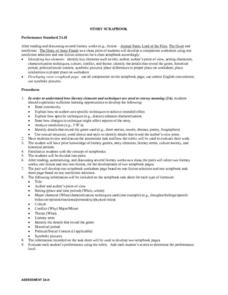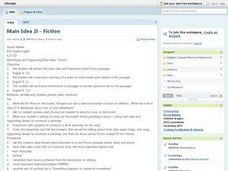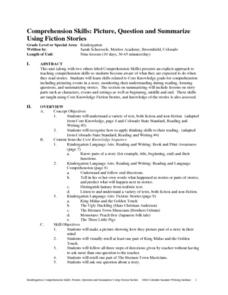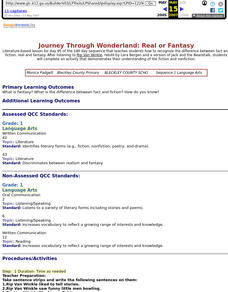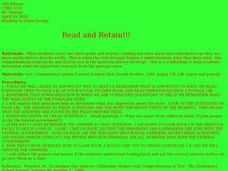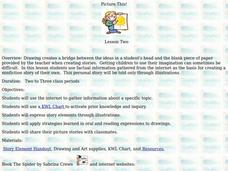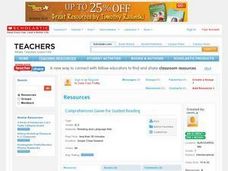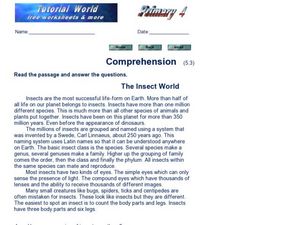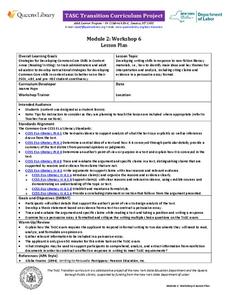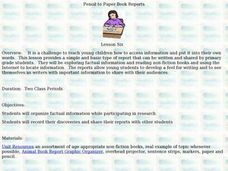Pennsylvania Department of Education
Stories? Information? What's the Difference?
Students listen to a power point presentation to distinguish between fiction and nonfiction text. In this what's the difference lesson, students identify fact from opinion within a text. Students listen critically and respond to text.
Curated OER
Story Scrapbook
Students develop a comparison worksheet using one non fiction book and one fiction book they have read to be put into a class scrapbook. In their comparison students must have title, author, point of view, setting, characters, and other...
Curated OER
Main Idea- Fiction
Eighth graders investigate the concept of main idea and supporting details, and how they are used in the genre of fiction. In this literacy lesson, 8th graders listen to a fictional passage and take notes on the characters, setting,...
Curated OER
Comprehension Skills: Picture, Question and Summarize Using Fiction Stories
Students build a variety of comprehension skills through the nine lessons of this unit. Picturing events, monitoring understanding during reading, forming questions, and summarizing stories form the core of the lessons being taught in...
Curated OER
Journey Through Wonderland: Real or Fantasy
First graders recognize the difference between fact and fiction, real and fantasy. After listening to Rip Van Winkle, retold by Lara Bergen and a version of Jack and the Beanstalk, 1st graders demonstrates their understanding of fiction...
Curated OER
Time Travel, Black Holes, and Relativity
Students read the novel, The Time Machine, and compare H.G. Well's perceptions of the future with those presented in The Third Wave, by Alvin Toffler. They research current scientific and mathematical theories that relate to space and time.
Curated OER
Read and Retain
Third graders practice strategies for aiding in their comprehension of material they read. Through guided practice, they read a selected piece of text and answer questions pertaining to what they have read. They practice looking back in...
Curated OER
Bank On It! Worms
In this science worksheet, students fill in 6 blanks to complete an article about worms. They select words from a word bank. Students must use knowledge punctuation and syntax to put the words in the correct blanks.
Curated OER
Analyzing Features of Consumer Text
Students evaluate consumer information. In this written communication lesson, students read nutrition facts from different foods and determine the foods that have the most healthful benefits.
Curated OER
Picture This
Students explore finding facts from the Internet to create a nonfiction story. In this writing lesson, students fill out KWL charts and do internet research about the given topic of spiders. Students then create and illustrate their non...
Curated OER
Parts of a Story
In this story activity, students read about different story elements such as setting, characters, plot, and theme. Each element is illustrator by a cartoon.
Curated OER
Sequencing
Students consider how cause and effect translate into sequencing in literary works. In this sequencing lesson plan, students read non-fiction passages about Eleanor Roosevelt and Clara Barton. Students complete graphic organizers based...
Curated OER
Read Across Texas
Sixth graders read various books about the state of Texas. They read their assigned book, write a book report, and create an illustration or a shadow box of a scene from their assigned book.
Curated OER
Animal Smarts Question Report
In this 10 question multiple choice worksheet, students choose the correct answer based on reading Animal Smarts. They read the non-fiction piece before determine the correct answers to the questions.
Curated OER
Comprehension Game for Guided Reading
Students play reading comprehension games. In this guided reading lesson plan, students play a comprehension game made by the teacher. Students may play the game before or after reading the story.
Curated OER
The Rest Cure: Gender in Medicine and Literature
Read and discuss "The Yellow Wall-Paper" and the gender issues that the story brings up. Use articles from the time period to analyze, complete with specific discussion questions. After two days, scholars write an essay based on topics...
Dream of a Nation
Writing a Narrative Essay
Imagine using narrative essays to encourage change. This multi-week unit plan does just that. After reading a series of articles from Tyson Miller's Dream of a Nation: Inspiring Ideas for a Better America, class members examine the...
Annenberg Foundation
Poetry of Liberation
How do writers use words to protest injustice, challenge the status quo, and shape their own identities? Individuals watch and discuss a video, read author biographies, write poetry and journals, develop a slideshow, and complete a...
Curated OER
Using Non-Text Features
Second graders examine graphs and charts from their local newspaper. As a class, they discuss what the data means and how it relates to the article. In groups, they are shown two sets of graphs or charts and they practice explaining...
Curated OER
Why is Reading Important?
Ninth graders discuss why reading is an important skill for them to use in their lives. In groups, they examine the problems someone might have out in the world if they are illiterate. They practice reading in ways that it makes it fun...
Curated OER
Reading Comprehension: The Insect World
In this comprehension activity, learners read a non-fiction passage titled, "The Insect World" and complete 5 short answer questions.
EngageNY
TASC Transition Curriculum: Workshop 6
Is a college education necessary for success in today's world? The class investigates the question, along with others at the end of the sixth workshop in a 15-part series. The lesson has four parts with multiple activities and...
Curated OER
Chinese Minority Cultures
Seventh graders identify the elements that characterize culture in literature.
Students analyze the representation of Chinese minority peoples
through textbooks. Students identify and interpret the differences among the people of China.
Curated OER
Pencil to Paper Book Reports
Students explore the concept of how to write a factual book report. In this book report lesson, students conduct research on various topics. Students then use the information to write a book report in their own words.
Other popular searches
- Non Fiction Reading Passages
- Reading Non Fiction
- Reading Non Fiction
- Active Reading Non Fiction
- Shared Reading Non Fiction
- Reading Non Fiction Text
- Non Fiction Reading Pre Test
- Non Fiction Reading Skills
- Non Fiction Reading Journal
- Non Fiction Reading Logs
- Lesson Non Fiction Reading
- Non Fiction Reading Lessons



